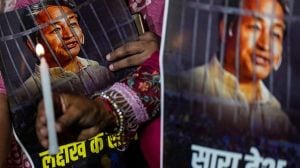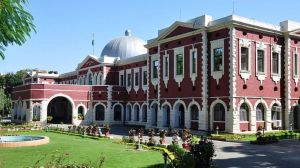Georgia declares ceasefire after Russian strikes, leaves S Ossetia
Georgia announced a cease-fire and pulled its forces out of the breakaway South Ossetia region on Sunday...

Georgia announced a cease-fire and pulled its forces out of the breakaway South Ossetia region on Sunday after three days of fighting and Russia said its troops controlled most of the separatist capital Tskhinvali.
A Georgian convoy of troops and artillery left South Ossetia through Ergneti, a village just inside Georgian-held territory south of Tskhinvali. They have been withdrawn, completely, Georgian interior ministry spokesman Shota Utiashvili told Reuters.
In Moscow, the Russian General Staff’s Col-Gen Anatoly Nagovitsyn confirmed the withdrawal was underway. He also told an official news briefing that Russian soldiers now controlled most of Tskhinvali.
Russia, the South Ossetian separatists’ main backer, had poured troops into the enclave and launched air strikes inside Georgia in response to a Georgian push to take control of it.
Russian officials said the death toll in fighting that began on Thursday stood at 2,000. Georgia said on Friday that it had lost up to 300 people killed, mainly civilians. The conflict in the heart of the Caucasus has raised alarm in the West, which is vying for influence with Russia over crucial oil and gas supply routes in the region. Russia is rankled by Georgia’s pro-Western policies and its drive for NATO membership.
Georgian spokesman Utiashvili said on Sunday that in the past few hours Russia had brought 6,000 troops into Georgia and a further 4,000 troops by sea.
Russia bombed a military airfield outside the Georgian capital early on Sunday and Tbilisi said the Russians were also massing troops in Abkhazia on the Black Sea, another rebel region that broke with Tbilisi in the early 1990s after a war.
Russian warships had arrived at Georgia’s Black Sea coast, RIA news agency quoted a Russian navy source as saying. Interfax agency said the naval force would stop weapons landing by sea. But RIA-Novosti news agency quoted a defence source as saying Russia had no plans to mount a blockade.
A naval blockade means war with Georgia, the source told RIA. We are not at war with Georgia.
Russia’s Nagovitsyn also denied Russian forces had hit any civilian targets during air raids and said they had only struck military units.
The Russian side has not hit any settlements. We have no right to attack civilian positions, he said.
The US government on Sunday deplored Russia’s actions in Georgia as dangerous and disproportionate.
We’re alarmed by this situation, James Jeffrey, US President George W Bush’s deputy national security adviser, said in Beijing where the president was attending the Olympics, speaking before the confirmation of the Georgian pull-out.
Georgia said that overnight, Russia had landed 4,000 troops by sea in Abkhazia.
Abkhaz leader Sergei Bagapsh said he had sent 1,000 troops to the disputed Kodori gorge and mobilised reservists. We are ready to act independently, he told reporters. We are ready to enforce order and go further if there is resistance from the Georgian side.
Russia was unbowed by Western criticism of its offensive. Russia’s actions in South Ossetia are totally legitimate, Russian Prime Minister Vladimir Putin said, adding there was little chance of South Ossetia being reintegrated with Georgia. “Georgia has struck a deadly blow against its own territorial integrity and therefore to its sovereignty. It is hard to imagine how South Ossetia can be persuaded to reintegrate with Georgia after this,” Putin said.
More than 30,000 refugees from South Ossetia had fled over the border in the past 36 hours, Putin said.
Georgia denied a Russian report that it had agreed with Russia to create humanitarian corridors to evacuate refugees. The majority of South Ossetia’s population is ethnically distinct from Georgians. Many have been given Russian passports since the enclave broke with Tbilisi in the early 1990s.





- 01
- 02
- 03
- 04
- 05


























